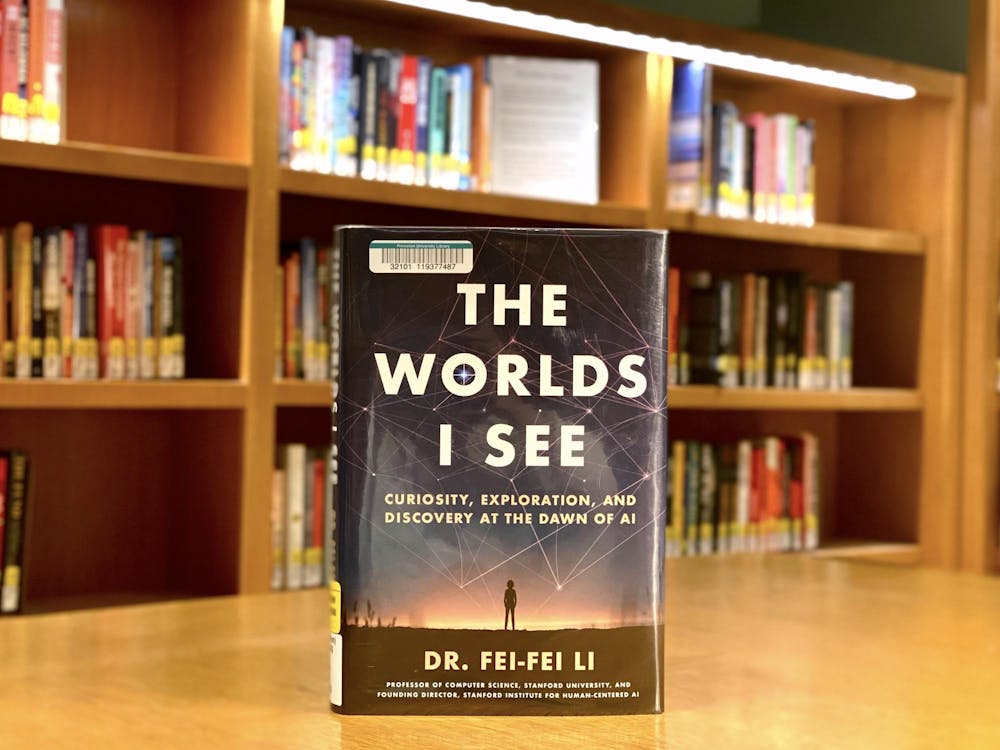On Friday, Feb. 23, the University announced that this year’s Princeton Pre-Read for the Class of 2028 will be “The Worlds I See” by Fei-Fei Li ’99.
The Princeton Pre-Read, inaugurated by President Christopher Eisgruber ’83 in 2013, “introduces incoming freshmen to Princeton’s intellectual life.” This year’s choice comes at a time of growing focus on artificial intelligence (AI) at the University and beyond.
Li is the first Sequoia Capital Professor in Computer Science at Stanford University and serves as co-director of Stanford’s Human-Centered Artificial Intelligence Institute (HAI). Last September, Li was included in the 2023 TIME100 list of the most influential people in the AI field.
Also in February, Li was awarded the Woodrow Wilson Award, an honor “conferred annually upon an alumnus or alumna of the undergraduate college whose achievements exemplify Woodrow Wilson’s memorable phrase ‘Princeton in the nation’s service.’”
“I have no idea why I deserve that award … Getting to Princeton as an undergrad was just such an honor for me, and especially in the context of a young immigrant who didn’t have much and didn’t have the fancy resume that my classmates had,” Li told The Daily Princetonian in an interview.
“Attending reaffirmed my admiration for Princeton because my classmates, my fellow students, and my professors, every one of them was just so incredible … So to receive that undergraduate award … I feel so humbled; it’s such an honor,” she added.
A specialist in AI, machine learning, deep learning, and computer vision, Li related her experiences in her memoir as a researcher, a Princeton student, and a Chinese immigrant in America — a blend of the deeply personal and professional. “The Worlds I See,” apart from its focus on the future of AI, articulates her experience and the difficulties Li faced.
In the press release announcing the Pre-Read, Eisgruber said that Li “writes poignantly about the challenges that she and her family faced, the opportunities they treasured, and her search for a sense of belonging in environments that sometimes made her feel like an outsider.”
Li explained that she did not set out to write a memoir — at the beginning of the pandemic in 2020, she was approached by an agent to write a book about AI.
“[My] philosopher friend [John Etchemendy], who’s also the co-director of Stanford’s Human-Centered AI Institute, literally called me in the middle of COVID to his backyard and he said ‘This is not good. You have to rewrite it … [because] a lot of technologists can write an AI story’” Li said. “‘But your personal journey is a voice that the young women, the immigrants, the people of all walks of life out there … can identify with.’”
Although Li noted that “it’s not my personality to write a memoir,” she said that she “feel[s] the essence of responsibility to tell the story from that perspective.”
The choice of the Pre-Read aligns with the University’s gravitation toward AI that has developed over the past year. The Princeton Language and Intelligence Initiative (PLI) was established in September 2023 to furnish resources and talent toward AI research and development under the leadership of director Sanjeev Arora.

In December 2023, Eisgruber met with Governor Phil Murphy to announce plans for the creation of an AI hub in New Jersey aimed at technological development, research, and ethical considerations. As of February 2024, the PLI has granted $798,000 to 14 different research projects centered around AI and large language models (LLMs).
Li supports the heavy emphasis placed on AI by universities. She stated that she “feel[s] a sense of crisis that [universities] are inadequately resourced to play the role.”
During the interview with the ‘Prince,’ Li phoned in from Washington, D.C., where she was attending the State of the Union address as a guest and meeting with members of Congress to advocate for a bill under consideration in the Senate. Called the CREATE AI Act, the bill hopes to establish the National Artificial Intelligence Research Resource (NAIRR) pilot program. The NAIRR will serve as a cloud and data commons for the public sector.
“Human civilization needs our leadership because as our technology and science change, and once in a while they change really rapidly, like what AI is doing right now, which brings inevitable social, political, and economic change,” Li said. “During this period of time of tremendous change, creating public goods is the responsibility of academia.”
“I always say there’s nothing artificial about artificial intelligence. It’s made by humans, it’s deployed by humans, it’s used by humans, and it’s governed by humans,” Li concluded.
While Li advocates for AI on the national stage, her work is inextricably tied to Princeton.
“At the very end of the day, one of the biggest impacts on my life is what Princeton has taught me: ‘In the nation’s service and the service of humanity.’ And that’s what this book is about. It’s seeing AI through that lens.”
Ethan Caldwell is a staff News writer for the ‘Prince.’
Please send corrections to corrections[at]dailyprincetonian.com.








